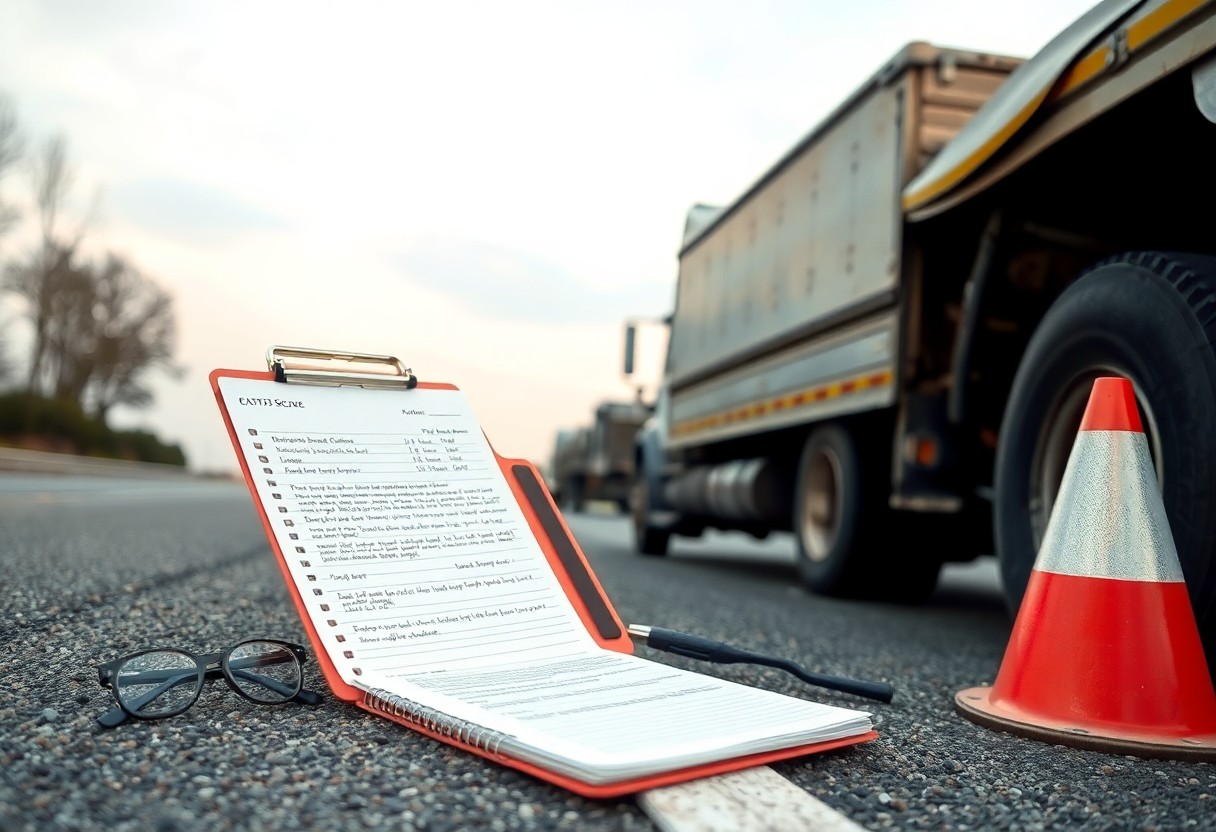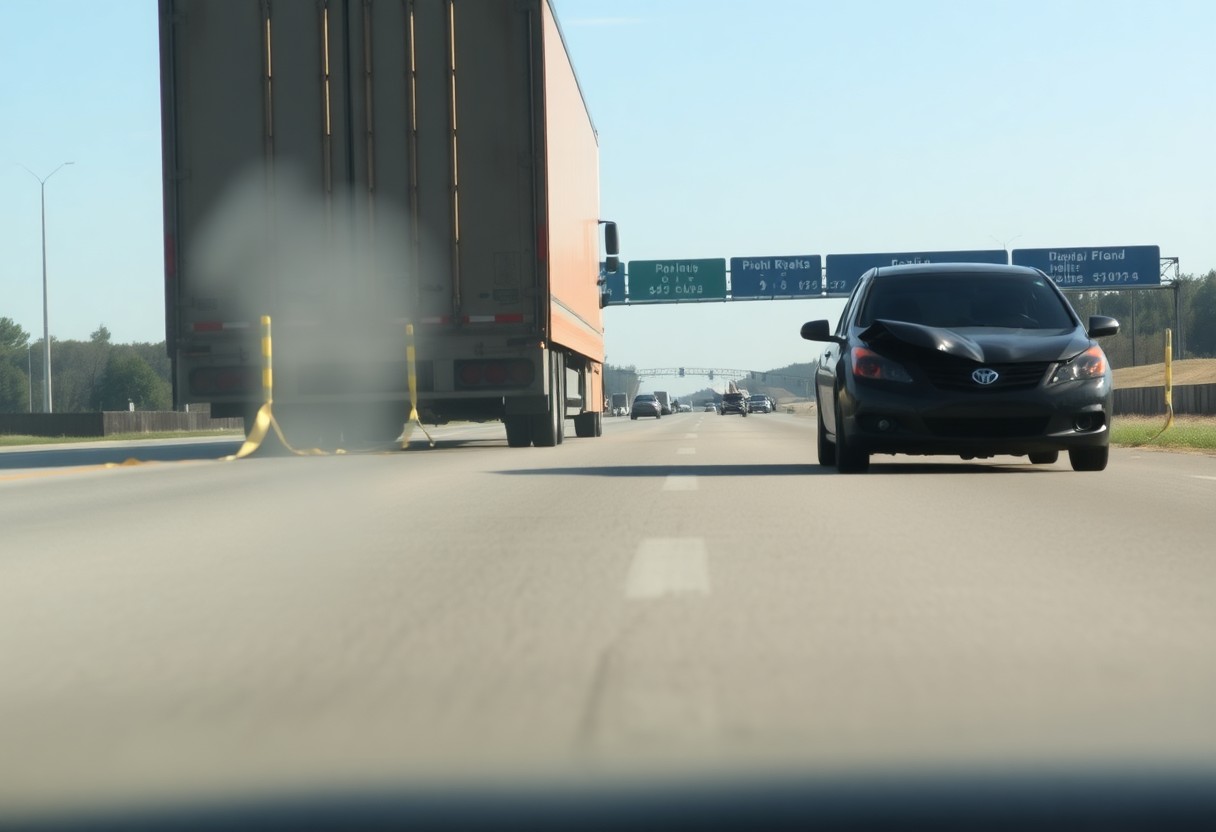Your rights following a truck crash in Mobile are paramount, and understanding how to protect them can significantly impact your recovery process. When involved in an accident, it’s imperative to take specific steps to ensure your legal rights are safeguarded. From gathering evidence to seeking medical attention, knowing what actions to take immediately can help you build a strong case. This guide will outline the necessary steps you should follow to effectively navigate the aftermath of a truck crash and protect your rights throughout the legal process.
Immediate Actions to Take After the Crash
After a truck crash in Mobile, it’s necessary to take immediate actions that protect your legal rights and ensure your wellbeing. First, check yourself and others for injuries and assess the situation around you. Avoid talking to anyone about fault or liability until you’ve consulted legal professionals. Your safety and the safety of others should always be the priority in the aftermath of such an incident.
Ensure Safety and Medical Attention
Ensure that you and all parties involved are safe, and call for medical assistance if anyone is injured. Even if injuries seem minor, it’s wise to get checked by a medical professional, as some injuries may not be immediately apparent. Prioritizing health will help document medical conditions related to the crash for any future proceedings.
Call Law Enforcement
Actions should be taken to call law enforcement to the scene as soon as possible. A police report can be an necessary piece of evidence for any legal matters arising from the crash.
Enforcement officers will document the accident and create an official report that outlines the details, including witness statements and vehicle damage. This report will be vital for insurance claims and any potential legal actions. File a report with law enforcement, and make sure to obtain the report number for your records. This documentation serves as a critical safeguard for asserting your rights in the aftermath of the incident.

Documenting the Incident
While it may be overwhelming after a truck crash, accurately documenting the incident is vital to protecting your legal rights. The information you gather, including evidence from the scene, witness statements, and accident details, can be instrumental in any future claims or litigation. Taking diligent notes can provide you with an advantage throughout the legal process, ensuring that you have a clear understanding of the events that transpired.
Gather Evidence at the Scene
Scene evidence can significantly impact your case’s outcome. Start by collecting as much information as possible, including the names and contact information of witnesses, the involved parties, and any law enforcement officers who arrive. Their accounts of the incident will be valuable during your legal proceedings and can help support your claims.
Take Photographs of Vehicles and Surroundings
Scene photographs provide a visual representation of the accident, which can be compelling evidence. Capturing images of all vehicles involved, their positions, and any damage they sustained helps to ensure an accurate portrayal of the event. Additionally, document surrounding elements such as traffic signals, road conditions, and skid marks, as these factors may ultimately play a role in determining fault.
Consequently, taking comprehensive photographs can serve to reinforce your account of the incident. These images can illustrate the severity of the collision and clarify details that might be overlooked in written statements. Having clear photographic evidence supports your narrative and can significantly bolster your case when negotiating with insurance companies or presenting to a court.
Communicating with Involved Parties
Clearly, effective communication with all involved parties following a truck crash in Mobile is vital to protect your legal rights. Engaging with other drivers, first responders, and witnesses can help clarify the sequence of events and establish facts surrounding the incident. Be sure to document all interactions and gather relevant details that may assist you later.
Exchange Information with Other Drivers
With each driver involved in the accident, it’s important to exchange imperative information. This includes names, contact numbers, vehicle registrations, and insurance details. Ensure that you also collect the contact information of any witnesses present, as their testimonies may be valuable when assessing liability and damages.
Avoid Admitting Fault
Any statement that implies fault can impact your case significantly. It’s vital to refrain from apologizing or admitting responsibility at the scene, even if you feel partly to blame. Your initial impressions may not capture the full picture as the incident is still unfolding.
And the implications of admitting fault can extend beyond the immediate aftermath of the crash. Once you acknowledge responsibility, insurance companies may use that against you, jeopardizing your chances of receiving proper compensation for damages or injuries. Therefore, prioritize gathering information and documenting the event before discussing fault, as it may become critical when negotiating claims or pursuing legal actions.
Reporting the Accident
Unlike minor collisions, truck crashes often involve more severe damages and injuries, making it imperative to report the accident immediately. Follow the local laws and contact the police to create an official report. This report not only documents the circumstances of the accident but also serves as significant evidence in any legal proceedings or insurance claims that may arise later.
Notify Your Insurance Provider
Among the first calls you need to make after a truck crash is to your insurance provider. Notify them promptly to ensure that they can assist you with filing a claim and understanding your coverage options. Prompt notification also helps in tracking any deadlines for filing your claim, allowing you to protect your financial interests effectively.
Understand the Importance of Timely Reporting
Insurance companies often have specific time frames for reporting accidents and filing claims. If you delay, you might jeopardize your ability to receive coverage for damages or medical expenses. It is in your best interest to report the accident as soon as possible to streamline your claim and maintain your rights under your policy.
With timely reporting, you play a vital role in building a strong case for yourself. Delays can lead to complications, including increased scrutiny from insurance adjusters and potential denial of your claim. Ensuring you provide all necessary information promptly can facilitate a smoother claims process and maximize your chances of obtaining the compensation you deserve. Don’t underestimate the impact that quick reporting can have on your legal rights and financial recovery.
Seeking Medical Attention
Now that the immediate aftermath of your truck crash has passed, seeking medical attention should be your top priority. Even if you feel fine, some injuries may not be immediately apparent. A timely medical evaluation can not only ensure your well-being but also serve as an important record for any future legal claims.
Get a Comprehensive Medical Evaluation
Against the odds, you may not fully understand the extent of your injuries right away. It is vital to get a thorough medical evaluation to identify any hidden issues. This step allows you to document your condition immediately following the crash, which can help substantiate your case if you decide to pursue legal action.
Follow Up on Any Injuries
Follow up with your healthcare provider to monitor any injuries sustained during the crash. Staying on top of your treatment plan will not only aid your recovery but also provide documented proof of your injuries in case complications arise later. Consistent follow-up appointments can demonstrate the seriousness of your injuries during any potential legal proceedings.
Attention to your health after a truck crash is vital. Regular communication with your doctor and adhering to the prescribed treatment plan will help you recover effectively. Keeping detailed records of your appointments, tests, and treatments can also be a significant asset in any legal matters that may follow the incident, strengthening your position as you seek compensation for your injuries.
Consulting with a Legal Professional
Your next step after a truck crash should be consulting with a legal professional who specializes in personal injury law. A knowledgeable attorney can help you navigate the complexities of your case, ensuring you fully understand your legal rights and options. They will assess your situation, gather necessary evidence, and advocate on your behalf to maximize your compensation.
Importance of Legal Representation
To effectively protect your rights and interests after a truck accident, having legal representation is necessary. A skilled attorney knows the ins and outs of personal injury cases and can level the playing field against powerful insurance companies. They can also help you avoid pitfalls that may jeopardize your claim.
Questions to Ask Your Attorney
By consulting with your attorney, it’s important to ask specific questions to ensure you are on the same page regarding your case’s direction. Inquire about their experience with truck accident cases, their strategy for your case, and how they plan to communicate with you throughout the process.
Hence, asking the right questions not only clarifies your attorney’s qualifications but also helps you gauge their commitment to your case. You may also want to discuss their fee structure and any potential costs that may arise during the legal process. Understanding these factors will empower you to make informed decisions and establish a solid foundation for your case moving forward.
Final Words
Presently, after a truck crash in Mobile, it is important to take proactive steps to protect your legal rights. Ensure you gather evidence at the scene, seek medical attention, and notify law enforcement. Collect witness information and obtain a copy of the police report for your records. Contact your insurance provider promptly and consider seeking legal guidance to navigate potential claims. By taking these measures, you position yourself to effectively address the aftermath of the incident and safeguard your interests moving forward.

















